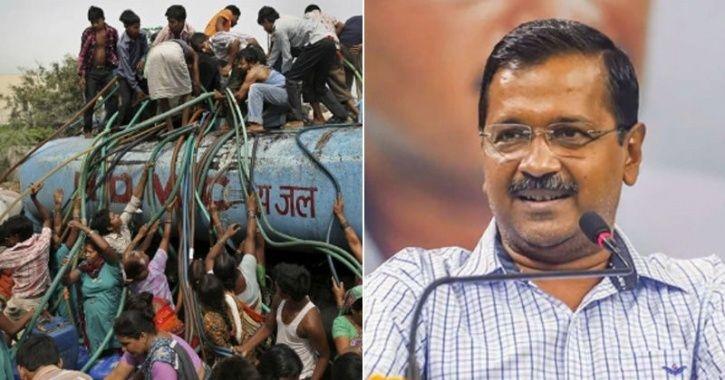Arvind Kejriwal, the messiah of freebie politics has done massive damage to the Union Territory of Delhi. The latest example of how he destroyed the public infrastructure of Delhi is the Bureau of Indian Standardisation (BIS) study which has ranked the drinking water quality in Delhi among the worst in the country.
Kejriwal, who is the chairman of Delhi Jal Board (DJB), promised free water to every citizen of Delhi in election manifesto and campaigns. After his government came to power, his government started delivering free water, but, the quality of water deteriorated.
As per the BIS survey, released by Union Consumer Affairs Minister Ram Vilas Paswan on Saturday, Delhi failed in almost 10 out of 11 parameters of drinking water.
“Arvind Kejriwal is giving poison to the people of Delhi in the name of free water supply. Delhi water was found to be the most poisonous in a survey of 20 cities. The AAP government is making tall claims of development but has failed to even provide safe drinking water to the people,” tweeted Health Minister and Chandni Chowk MP Harsh Vardhan.
फ्री पानी के नाम पर #दिल्ली की जनता को ज़हर पिला रहे हैं @ArvindKejriwal
देश के 20 शहरों के #पानी पर हुए सर्वे में दिल्ली का पानी सबसे ज्यादा जहरीला पाया गया।
विकास के बड़े-बड़े दावे करने वाली @AamAadmiParty सरकार लोगों को साफ़ पानी तक मुहैया कराने में नाकाम रही है। pic.twitter.com/fePhjjoNtf
— Dr Harsh Vardhan (Modi Ka Pariwar) (@drharshvardhan) November 17, 2019
Since the AAP government came to power, the Delhi Jal Board posted loss of more than 800 crore rupees. In FY 2015-16 the board posted loss of 209 crore rupees, 533 crore rupees in FY 17, and 275 crore rupees loss in FY 18.
The loss for the years before Kejriwal government came to power is zero. The water quality deteriorated over the years as proper instruments were not installed for purification. Given the loss of crores of rupees, the board could not afford costly purification equipment.
It is very convenient for Kejriwal to claim that his government is giving free water to every family while the quality of water is deteriorating. ‘Free water’ suits the populist politics of Kerjriwal, but, the people of the state are forced to drink poor quality water. The people of the city are already suffering from toxic environment due to smoke, they are also forced drink toxic water.
The freebie politics of Kerjriwal has destroyed the public transportation of the city too. Under the regime of Kejriwal, the total number of buses under Delhi Transport Corporation (DTC) has gone down as, the transportation body is suffering massive financial loss, and the Delhi government is not ready to support it.
After the Kerjriwal government came to power in 2015, free water was announced for 22 lakh water connection which consumer 20,000 litres per month. The Jal Board is mandated to hike the water rates by 10 percent every year, but, after Kejriwal government came to power, it has not increased the prices given the populist promises of Kerjriwal.
It has been almost five years of Kejriwal as Chief Minister of Delhi. In these five years, the infrastructure of Delhi has not improved a bit. No new buses have been introduced, no new roads have been built, and no steps to improve the air quality have been taken.
The deterioration of city’s water quality is an example of Kejriwal’s freebie politics. After people started asking questions about Delhi’s water quality, Kejriwal called the report “false and politically motivated”.
The country is facing a very serious water crisis and the problem is that concern around the matter seems very limited. According to the NITI Aayog, India is suffering from the worst water crisis in its history and millions of lives and livelihoods are under threat. “Currently, 600 million Indians face high to extreme water stress and about two lakh people die every year due to inadequate access to safe water.” It is estimated the crisis is going to get worse by 2030 when India’s water demand is projected to be twice the available supply.
‘Har Ghar Jal’ is a great initiative because as of today, only 18.24 percent (32.57 million out of 178.54 million) households have access to piped water. As per estimation by NITI Aayog, the country would bear a 6 percent loss in GDP by 2020 due to water-related issues, if the crisis is not dealt with on a priority basis. As per the report, 21 Indian cities including Delhi, Bengaluru, Chennai and Hyderabad will face a shortage of groundwater by 2020 and it will impact living of around 10 crore people.
